新目标英语七年级下册总复习资料2
(完整版)新版新目标英语七年级下册unit2知识点总结

Unit 2 What time do you go to school?Section A1.get dressed 穿衣服表示穿的动作be dressed in+颜色/衣服穿着表示穿的状态2.brush one’s teeth 刷牙brush n 刷子brushes v 刷take a shower=have a shower 洗澡3.(1)what time 几点问具体时间,一般回答要具体到小时(2)when对时间提问,询问日期、月份、年份,回答既可是具体的时间,也可是不具体的时间,in the morning,last year,in 1998 等范围大的时间,When does he take a shower?他什么时候洗澡?He takes a shower in the morning. 他在早上洗澡。
I take a shower at 6 o’clock in the morning.我早上六点洗澡。
4.at in on(1)at + 具体时间点,在几点(几分)固定搭配at 7:00 at night at noon(2)in + 时间段(周,年份,月份,季节,早中晚)in 1942 in the morning in May(3)on + 星期/日期/节日或具体某一天的早中晚on a cold winter night on Children’s Day on Monday5. always usually often sometimes 频度副词,常用于动词be 助动词或情态动词之后,行为动词之前。
(1)always(100%) 总是、永远,表动作重复,状态继续,中间没间断,通常修饰动词的一般时态。
若修饰进行时,则有“老是”,“再三地”的意思,带有厌烦、不满、赞美等感情色彩。
(2)usually(80%)通常,着重表示已习惯的动作。
反义词unusually(3)often(60%)时常、经常,表示常常这样,但不总是这样,反义词seldom(4)sometimes(30%)有时、不时,说明的是偶尔发生的事情或情况。
人教版新目标英语七年级下1-2单元复习

Unit One复习词组1. 你哥哥的笔友 your brother’s pen pal2. 来自于…… come from = be from3. 居住在…… live in4. 说一点儿法语 speak a little French5. 他笔友最喜欢的语言 his pen pal’s favorite language6. 在周末 on weekends7. 告诉我你自己的情况 tell me about yourself 8. 什么语言 what language9. 给我写信 write (a letter) to me 10. 喜欢/不喜欢做某事 like doing / dislike doing sth. 课文句子1.Where is your pen pal from = Where does your pen pal come from?你的笔友来自哪里?She is from Japan.= She comes from Japan. 她来自日本。
2.Where does your pen pal live ? 你笔友居住在哪里?He lives in Sydney.他住在悉尼。
3.What language do you speak ? 你说什么语言? I speak Chinese.我说汉语。
4.What language can you speak?你会说什么语言?I can speak Chinese and a little English. 我会说汉语和一点点英语。
5.Does she have any brothers or sisters? 她有兄弟姐妹吗?Yes,she does. She has two brothers and two sisters. 是的,她有兄弟姐妹。
她有两个哥哥和两个妹妹。
6.What’s her favorite subject in school ?她在学校最喜欢的学科是什么?Her favorite subject in school is math.她在学校最喜欢的学科是数学。
七年级英语下册Unit2Whattimedoyougotoschool短语语法知识点汇总新版人教新目标版
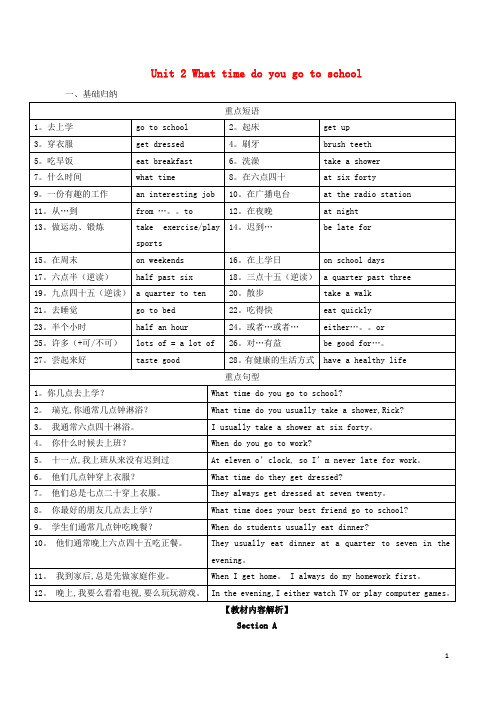
Unit 2 What time do you go to school 一、基础归纳【教材内容解析】Section A1.get dressed (P。
7)get dressed意为“穿上衣服”,dress用作动词,表示“给(某人)穿衣服”,接宾语时,只能接表示人的名词或者代词。
He can’t dress himself。
I usually dress my daughter before I go to work。
【拓展】辨析wear, put on和dress2.take a shower (P。
7)take a shower意为“洗淋浴”,相当于have a shower,shower用作名词,表示“淋浴”。
I often take a shower in the evening。
I take a cold shower when I feel tired。
3.What time do you usually get up, Rick? (P。
7)(1)what time用来询问具体的时间点,表示“什么时候”。
What time do you go to school?(2)usually是频度副词,意为“通常、一般”,在句中作状语,一般位于实义动词之前,连系动词be、助动词或者情态动词之后。
I usually have lunch at school。
He usually goes to school by bike。
4.I never get up so early。
(P。
8)early此处用作副词,表示“很早地”,反义词为late,意为“晚地”。
Please come to school early tomorrow。
【拓展】early还可以用作形容词,表示“早的、提前的”,反义词是late,意为“晚的”。
He gets up early to catch the early bus。
【K12学习】新目标七年级英语下册知识点 词汇、听力及语法
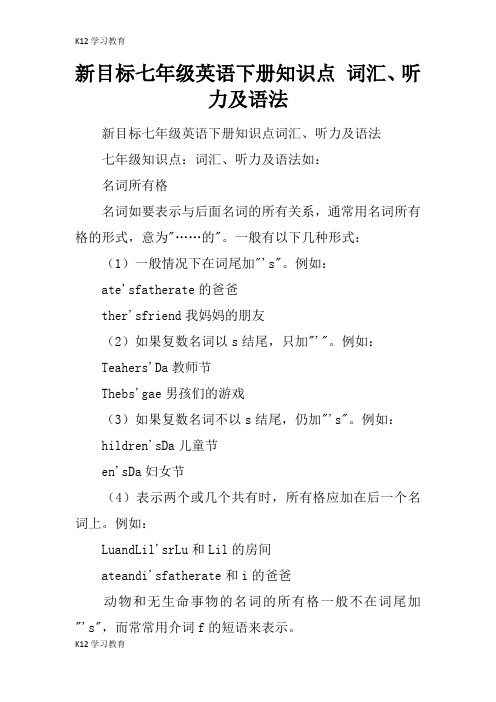
新目标七年级英语下册知识点词汇、听力及语法新目标七年级英语下册知识点词汇、听力及语法七年级知识点:词汇、听力及语法如:名词所有格名词如要表示与后面名词的所有关系,通常用名词所有格的形式,意为"……的"。
一般有以下几种形式:(1)一般情况下在词尾加"'s"。
例如:ate'sfatherate的爸爸ther'sfriend我妈妈的朋友(2)如果复数名词以s结尾,只加"'"。
例如:Teahers'Da教师节Thebs'gae男孩们的游戏(3)如果复数名词不以s结尾,仍加"'s"。
例如:hildren'sDa儿童节en'sDa妇女节(4)表示两个或几个共有时,所有格应加在后一个名词上。
例如:LuandLil'srLu和Lil的房间ateandi'sfatherate和i的爸爸动物和无生命事物的名词的所有格一般不在词尾加"'s",而常常用介词f的短语来表示。
aapfhina一幅中国地图thenaefherat她的猫的名字apitureffail我的家庭的一张照片thedrfthebedr卧室的门2祈使句祈使句主要用来表示说话人的请求、命令、建议、叮嘱等意图。
祈使句一般不用主语,读时用降调。
为使语气委婉、礼貌,常在句首或句尾加please。
在句尾时,please前多用逗号。
(1)祈使句肯定形式的谓语动词一律用动词原形。
Gandsee去看看。
ein,please请进。
(2)祈使句的否定形式常用dn't于句首。
Dn'tlaturbs不要看书。
Dn'tplantherad不要在马路上玩。
3Therebe的句子结构Therebe是一个"存在"句型,表示"有"的意思,肯定句的形式为:Therebe+名词(单数或复数)+地点状语或时间状语。
2020年人教新目标英语七年级下册Unit2重点知识总结及单元检测试题(含答案)
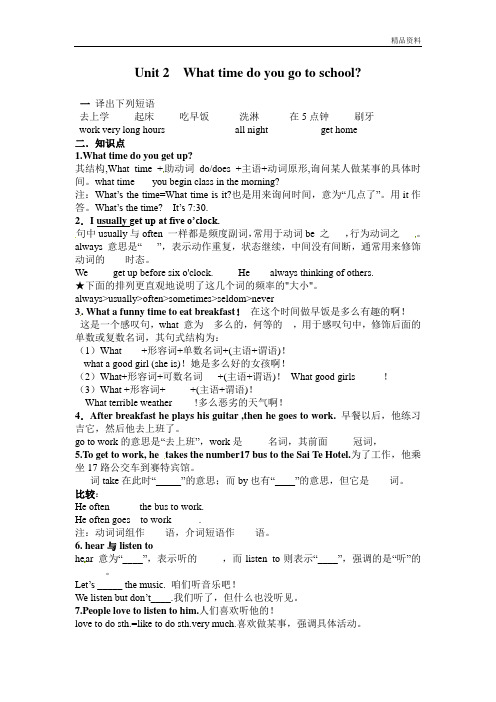
Unit 2 What time do you go to school?一译出下列短语去上学_____起床_____吃早饭______洗淋______在5点钟_____刷牙______ work very long hours______________all night ________ get home_________ 二.知识点1.What time do you get up?其结构,What time +助动词do/does +主语+动词原形,询问某人做某事的具体时间。
what time ___you begin class in the morning?注:What’s the time=What time is it?也是用来询问时间,意为“几点了”。
用it作答。
What’s the time? It’s 7:30.2.I usually get up at five o’clock.句中usually与often 一样都是频度副词,常用于动词be 之___,行为动词之___。
always 意思是“___”,表示动作重复,状态继续,中间没有间断,通常用来修饰动词的____时态。
We ____ get up before six o'clock. He ___ always thinking of others.★下面的排列更直观地说明了这几个词的频率的"大小"。
always>usually>often>sometimes>seldom>never3. What a funny time to eat breakfast!在这个时间做早饭是多么有趣的啊!这是一个感叹句,what 意为多么的,何等的,用于感叹句中,修饰后面的单数或复数名词,其句式结构为:(1)What____+形容词+单数名词+(主语+谓语)!what a good girl (she is)!她是多么好的女孩啊!(2)What+形容词+可数名词___+(主语+谓语)!What good girls _____!(3)What +形容词+_____+(主语+谓语)!What terrible weather ____!多么恶劣的天气啊!4.After breakfast he plays his guitar ,then he goes to work. 早餐以后,他练习吉它,然后他去上班了。
新目标(人教)七年级下册英语单元复习课件 Unit 2复习课件

具体时刻,也可询问日期、月份、年份等。 ②when常用来提问年、月、日、上/下午等大概时间,此时
when不可与what time替换。
From twelve o'clock at night to six o'clock in the morning.从夜里十二点到早上六点。
on weekends
radio show
16.几点 ____w_h__a_t_t_i_m__e_______
1178..一半份小有时趣__的__工___作____a__n____i__n__t__e__r__e___s__ti_n_g__j_o_b__ 19.要么……要h么al…f …an;h或ou者r……或者…… ____________________ 20.做作业 _________________________
either...or...
do (one’s) homework
21.去睡觉 __g_o__t_o__b__e_d_________ 2223..到散家 步;__走g__e一_t__走h_o__m_____e_________________________ 24.快速地吃 _________ta__k_e__a__w_a__lk_ 25.做运动 ____________________
play computer games
go home
三、核心句型
1. 里克,你通常几点钟洗淋浴?
__W__h_a_t_ _t_im__e___ do you usually _t_a_k_e__ __a_ _s_h_o_w__e_r,Rick? 2. 我通常在六点半起床。 I _______ ____ _____ at six thirty. 3.u—su—a斯lly科g特et,u你p的广播节目在几点?——从夜里12点到早上6点。 —Scott,________ ________ is your radio show? —_______ wtwhealvte o'cltoimckeat night _______ six o'clock in the morning.
《新目标英语》七年级下册重点句型、短语归纳(2)

Unit 8 I’d like some noodles.Ⅰ、Useful expressions:1. I’d like = I would like 我想要2. what kind of … 哪种……3. beef and tomato noodles 牛肉西红柿面4. what size bowl of … 多大碗的……5. he’d like = he would like 他想要6. a small/medium/large bowl of … 一份儿小碗的/ 中号的/ 大碗的……7. a large glass of orange juice一大杯橙汁8. green tea/black tea绿茶/红茶9. at the House of Dumplings 饺子馆10. have some great specials 有些很棒的特色餐11. lunch special 特色午餐12. get dumplings 吃饺子13. strawberry and banana ice cream 草莓香蕉冰淇淋14. a small orange juice 一小杯桔子汁儿15. a bowl of beef and tomato noodles 一碗番茄牛肉面16. what size of dessert 多大尺寸的甜品17. order sth. 点(菜或者饮料……)Ⅱ、Sentences:1. I’d like some noodles . 我想要点面条。
2.What kind of noodles would you like? 你想要哪种面条?3.What size bowl of noodles would you like? 你想要多大碗的面条?I’d like a small/medium/large size bowl. 我想要一小/中/大碗。
4. What kind of noodles do you have? 你这儿有哪种面条?3.What size do you have? 你这儿有多大份儿的?4.I like … and …我喜欢……和……5.I don’t like … or … 我不喜欢……和……6.Special 1 has beef and onions. 一号特色餐有牛肉和洋葱。
新目标(Go for it)版七年级英语下册各单元知识点总结
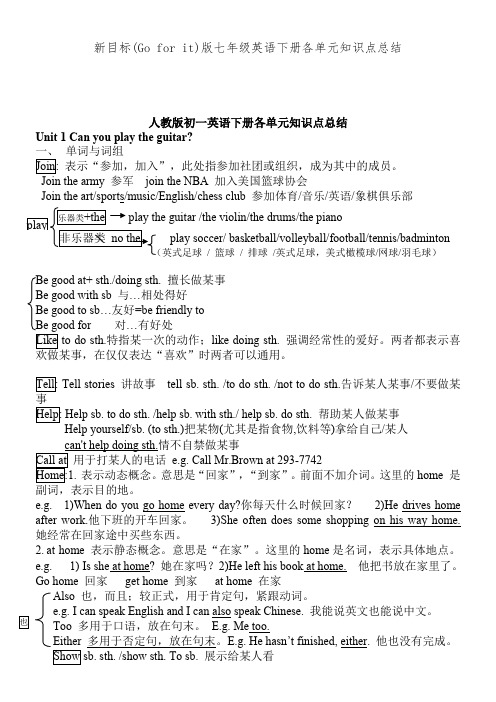
新目标(Go for it)版七年级英语下册各单元知识点总结人教版初一英语下册各单元知识点总结Unit 1 Can you play the guitar?一、 单词与词组表示“参加,加入”,此处指参加社团或组织,成为其中的成员。
Join the army 参军 join the NBA 加入美国篮球协会Join the art/sports/music/English/chess club 参加体育/音乐/英语/象棋俱乐部play soccer/ basketball/volleyball/football/tennis/badminton / 篮球 / 排球 /英式足球,美式橄榄球/网球/羽毛球)Be good at+ sth./doing sth. 擅长做某事Be good with sb 与…相处得好Be good to sb …友好=be friendly toBe good for 对…有好处特指某一次的动作;like doing sth. 强调经常性的爱好。
两者都表示喜讲故事 tell sb. sth. /to do sth. /not to do sth.告诉某人某事/不要做某帮助某人做某事Help yourself/sb. (to sth.)把某物(尤其是指食物,饮料等)拿给自己/某人e.g. Call Mr.Brown at 293-7742意思是“回家”,“到家”。
前面不加介词。
这里的home 是e.g. 1)When do you go home every day?你每天什么时候回家? 2)He drives home after work.他下班的开车回家。
3)She often does some shopping on his way home. 她经常在回家途中买些东西。
2. at home 表示静态概念。
意思是“在家”。
这里的home 是名词,表示具体地点。
2020年人教新目标版初中英语七年级下册第二单元讲义重点短语语法归纳及练习

UNIT2 讲义第一部分 【重点短语】What time go to school get up take a shower brush one’s teeth get to do one’s homework go to work go home eat breakfast穿上衣服 上床睡觉要么……要么 take a walk大量;许多 radio station Bus station at night迟到 on weekends eat quickly play sports玩电子游戏 be good for Half past six it tastes good From to a quarter to six第二部分 【重点语法】一.what time 与what 引导的特殊疑问句What time询问某事发生的具体时间点what均可询问做某事的具体时间询问某事发生的年份,月份,日期例句:1.What time do you get up?=When do you get up?I get up at 6:30/2.What time is it now?“现在多少点钟?”It’s 8:00.3.When is your birthday?It’s on March 3rd .二.频度副词(表示做某事重复的次数)1.AlwaysUsually Often Sometimes Hardly ever never 总是通常经常有时几乎从不决不,从不1.频度副词的位置(简单归纳:be/助/情之后,实义动词之前)例句:She is always busy.(be 动词之后)I will always like you.(助动词之后)I can always get up early.(情态动词之后)We often play chess after school.(实义动词之前)2.对频度副词提问,用how often.“多久一次”-How often do you exercise? 你多久锻炼一次?-I never do exercise. 我从不。
新目标七年级英语下册各单元考点总结

在具体几点中介词用at,在一个比较小的场所,介词用at
At 7 o’clock
在家at home在学校at schoolatthepool在游泳池
现在进行时得一些考点,现在分词构成等
Example:Look!The twins_____their mother do the housework.
Is Aunt Wang there? –Yes,she is/No,she isn’t.
Thank you for joining CCTV’s Around The World show?
What’s she doing?she’s cooking
考点解析:
It不仅用来指物还用来指代天气,指代事情:
a pop singer一位流行歌手wear glasses/pink shirt戴着眼镜/穿着粉色寸衣
go shopping去购物the captain of the basketball team篮球队队长
curly /short/straight/long hair卷/短/直发
ofmedium height/build中等高度/身体
With表示有什么…;人带着…,和…如:Come with your sister.和你姐姐一起来
-What does Lee look like? -He’s tall _________ blonde hair.
A. in B .on C. with .D has
a little(bit)一点儿…
It is a good place to do sth.
It is a good place to have fun.
Unit 3Why do you like koalas?
新版教材新目标英语七年级下期末总复习Unit1-2_单元测试

Unit 1--- Unit2一、.单项选择。
( ) 1. ____ do you spell Wednesday?A. WhatB. HowC. WhichD. Why( ) 2. Those people can ____ Chinese.A. sayB. say toC. speakD. talk( ) 3. They can ____ English.A. speak manyB. much speakC. a little speakD. speak a little( ) 4. The yellow shirt is ____.A. herB. myC. yourD. his ( ) 5. Her brother ____ lunch at school.A. .isn’t haveB. hasn’t haveC. doesn’t hasD. doesn’t have ( ) 6. He can play ____. And he can play ____, too.A. basketball … the pianoB. a basketball…a guitarC. the basketball…pianoD. basketball…guitar ( ) 7. My mother can’t ____ a cake.A. doB. to doC. to makeD. make ( ) 8. I ____ a cup of tea.A. want toB. wantC. like toD. could like ( ) 9. Mrs. Green ____ buy a nice dress ____ her daughter.A. want, toB. wants to, forC. want to, forD. wants to, as( ) 10. Please ____ us a story, Granny.A. speakB. tellC. sayD. talk ( ) 11. ____ I come in, please? I’m sorry. I’m too late.A. WouldB. DoC. AmD. May ( ) 12. Our teacher always helps us ____ our English.A. forB. intoC. onD. with ( ) 13. Don’t ____ Chinese in English class.A. talkB. speakC. sayD. tell ( ) 14. He said he became ____ in physics.A. interestB. interestsC. interestedD. interesting ( ) 15. There are many ____ on the playground.A. leafesB. leafC. leavesD. leafs ( ) 16. -- Can you speak Russian?-- Yes, but only ____.A. littleB. a littleC. fewD. a few ( ) 17. There is ____ water in the bottle. You have to get some.A. littleB. a littleC. fewD. a few ( ) 18. Wang Wei is a ____ worker. She works very ____ in the factory and we all like her.A. well, wellB. good, goodC. good, wellD. well, good( ) 19. My grandpa doesn’t want ____ at home. He wants ____ out for a walk on Sunday.A. to stay, goB. stay, goC. stay, to goD. to stay, to go ( ) 20. She can’t ____ the difference between the two cars.A. sayB. talkC. speakD. tell二、连词成句。
新目标七年级英语下册Unit 2词汇与句型精练及答案
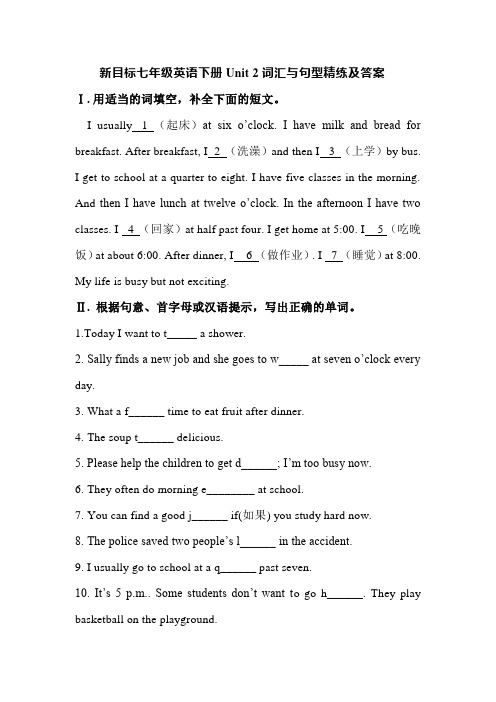
新目标七年级英语下册Unit 2词汇与句型精练及答案Ⅰ. 用适当的词填空,补全下面的短文。
I usually 1 (起床)at six o’clock. I have milk and bread for breakfast. After breakfast, I 2 (洗澡)and then I 3 (上学)by bus.I get to school at a quarter to eight. I have five classes in the morning. And then I have lunch at twelve o’clock. In the afternoon I have two classes. I 4 (回家)at half past four. I get home at 5:00. I 5 (吃晚饭)at about 6:00. After dinner, I 6 (做作业). I 7 (睡觉)at 8:00. My life is busy but not exciting.Ⅱ. 根据句意、首字母或汉语提示,写出正确的单词。
1.Today I want to t_____ a shower.2. Sally finds a new job and she goes to w_____ at seven o’clock every day.3. What a f______ time to eat fruit after dinner.4. The soup t______ delicious.5. Please help the children to get d______; I’m too busy now.6. They often do morning e________ at school.7. You can find a good j______ if(如果) you study hard now.8. The police saved two people’s l______ in the accident.9. I usually go to school at a q______ past seven.10. It’s 5 p.m.. Some students don’t want t o go h______. They play basketball on the playground.III. 用括号内所给单词的适当形式填空。1. My mother often _______ (watch) TV at 7:00 every evening.2. We usually have breakfast at six ______ (clock) in the morning.3. What time does your sister ______ (go) home every day?4. Please come in and have a cup of tea with _______ (we).5. My little brother ______ (not do) his homework at six in the evening.6. Please brush your ______ (tooth) after you get up.7. Many students have a lot of _______ (homework) to do every day.8. What time do you want ______ (have) your lunch?9. They ______ (usual) go home after school.10. They are the______ (child) books.Ⅰ. 填入适当的单词补全对话。
新目标英语七年级下Unit_2_What_time_do_you_go_to_school单元复习课
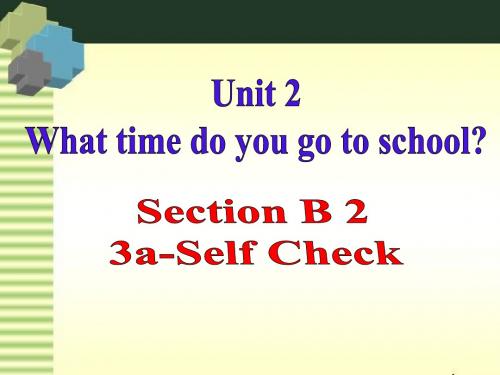
always 总是
Gina gets up at six in the morning.
Gina always gets up at six in the morning.
Bob eats bread for breakfast. Bob always eats bread for breakfast.
Number the pictures and make a common daily routine. 3 5 4 8
9
2
10
11
6
7
1
Number these sentences in order to 3a make a story about a daily routine. ___ 3 I usually exercise from six to seven. ___ 2 I always get up at six. ___ 5 After that, I always brush my teeth and go to school at eight. ___ 4 Then I quickly have a shower and eat breakfast. ___ 6 I have lunch at a quarter to twelve. ___ 7 I get home from school at half past four and do my homework. ___ 1 I have a very healthy life. ___ 8 I have dinner at seven thirty. ___ 9 I go to bed at ten.
2020-2021学年人教版新目标英语七年级下 unit1-2复习(单词填空、变形专项)(含答案3)

人教版新目标英语七年级下unit1-2复习一、单词填空1.We n_____ help at the old people’s home.2.Zheng Yuanjie can w ___________ many interesting stories. He's a writer.3.We w______ students for the school show.4.He likes to play basketball. So he wants to j_____ the basketball club.5.Can they play ________ (象棋)?6.Alice wants to join the music club for the school ________(演出).7.Can you s______ your family photo to me?8.Sally finds a new job and she goes to w_____ at seven o’clock every day.9.We are in the same ________(组)and we should help each other(互相).10.Can you s______ French? -Yes, I can.11.There are some children in the playground.______(一半)of them are boys.12.You can find a good j______ if(如果) you study hard now.13.I think Lin Dan is the b_____player and I like him very much.14.Please _______ (帮助) me with English.15.What a f______ time to eat fruit after dinner.16.We don’t go to school on S______ or Sunday every week.17.Now the room is very c______.It's not dirty.18.- Who is your favorite m ___________ ? -Liu Huan.19.They often do morning e________ at school.20.Wang Han is a famous TV host(主持人)and he ________(工作)for Hunan TV station.二、用所给单词的适当形式适当形式填空1.His sister loves ____(play) the piano very much.2.Look! Mike is ______(write)an e-mail to his cousin.3.He _______ (not like) the school show.4.They ______ (usual) go home after school.5.My father usually takes a ________(shower) in the morning.6.You need_____(brush) your teeth after eating.7.We always _____(clean)our classroom after school.8.She ______( do) her homework in the evening.9.--- Does your little brother like ______ (eat) chicken?--- No, he doesn't.10.Please come in and have a cup of tea with _______ (we).11.Let’s join the___________ (paint)club.12.December 22nd is his _____(fifty)birthday.13. I don't have much time for breakfast, so I usually eat very _____ (quick)14.Jenny has found it easy to make _______(friend)at school.15.Mary is busy _____ (do)her homework16.My sister usually gets up and gets _____(dress) at about five forty.17.Sally is busy______(do) her homework.18.My brother often_____(study) with me.19.Mr Wang teaches______(they )math.20.I speak English very___________ (good),and I join the English club.21.We usually have breakfast at six ______ (clock) in the morning.22.Helping with sports for English-speaking students is very ___________(relax)and easy.23.Let’s___________ (sing) a dong before the class.24.Who_____(help)you with your English?25.The old man saves(挽救) many animals______(life) every year.答案一、单词填空1.need2.write3.want4.join5.chess6.shows7.show8.work9.group 10.speak11.half 12.job 13.best 14.help 15.funny16.Saturday 17.clean 18.musician 19.exercise 20.works二、用所给单词的适当形式适当形式填空1.playing2.writing3.doesn't likeually5.shower6.to brush7.clean8.does9.to eat 11.painting 12.fiftieth 13.quickly 14.friends 15.doing 16.dressed 17.doing 18.studies 20.well21.o'clock 22.relaxing 23.sing 24.helps 25.lives。
七年级英语下Unit 2 知识点归纳与复习人教新目标版

新目标七年级下Unit 2 知识点归纳与复习单元知识清单一、重点单词:1. libr r 图书馆2. rest rant 餐馆3. superm ket 超市4. str t 街道5. p k 公园6. c nt 中心7. br ge 桥8. n 在……附近9. acr 横过10. n xt 贴近11. betw n 在两者之间12. fr nt 前面13. t n 转弯14. l ft 左边15. r t 右边16. cl n 清洁的17. qu t 宁静的18. d ty 肮脏的19. h se 房子20. welc m 欢迎21. g den 花园22. enj 欣赏23. w k 散步24. thr 穿过25. begin 开始26. t 旅行27. v s t 参观28. pl ce 地方29. h gry 饥饿的30. a ive 到达31. w 路线32. t ke 乘, 坐33. t x 出租车34. airp t 飞机场35. p ss 通过36. h pe 希望二、必会短语1. post 邮局2. phone 投币式公用电话3. in of 在……前面4. on 在右边5. take 散步6. fun 玩得开心7. turn 向左转8. across 在……对面9. take 坐出租车10. have a 旅途愉快三、应知语法和句式:1. 表示在某地有某物用there be。
如:在这附近有一家银行。
a bank near here.2. There de 的一般问句是将be放到there的前面。
如:有一个超市吗?a supermarket?肯定回答是:Y es, .否定回答是:No, .3. 本课学习的两种问路方式:一种是:用Is there …? 如:在这附近有公用电话吗?a pay phone near here?另一种是:用Where is the …? 如:图书馆在哪?the library?4. welcome to …表示欢迎到某地。
新目标七年级英语下册Unit 2 Where's the post office讲解与练习

Unit 2 Where’s the post office?讲解与练习讲解一. Asking ways: (问路)(1)Where is ……?(最近的)……在哪里?Where's your school?(2)Can you tell me the way to ……?你能告诉我去……的路吗?Can you tell me the way to your school?(3)How can I get to ……?我怎样到达……呢?How can I get to your school?(4)Is there …… near here / in the neighborhood? 附近有……吗?Is there a shcool near here / in the neighborhood?(5)Which is the way to ……?哪条是去……的路?Which is the way to your school?二.Showing the ways: (指路)1. Go straight down / along this street. 沿着这条街一直走。
2. Turn left /Turn right.向左转/向右转。
三.词组1. across from … 在……的对面across from the bank 在银行的对面2. next to… 紧靠…… next to the supermarket 紧靠超市3. between…and…在……和……之间between the park and the zoo 在公园和动物园之间4. in front of… 在……前面There is a tree in front of the classroom.课室前面有棵树。
in the front of… 在……(内)的前部There is a desk in the front of the classroom.课室内的前部有张桌子。
2020-2021学年人教版新目标英语七年级下册 unit1-2复习(单选、完成句子)(含答案)
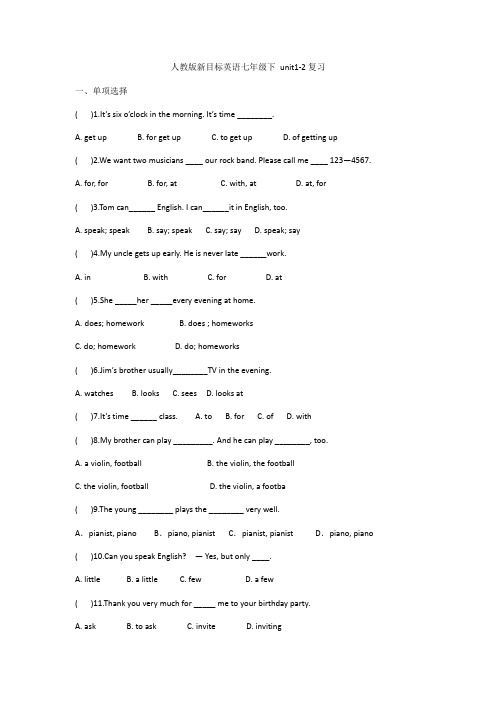
人教版新目标英语七年级下unit1-2复习一、单项选择( )1.It’s six o’clock in the morning. It’s time ________.A. get upB. for get upC. to get upD. of getting up( )2.We want two musicians ____ our rock band. Please call me ____ 123—4567.A. for, forB. for, atC. with, atD. at, for( )3.Tom can______ English. I can______it in English, too.A. speak; speakB. say; speakC. say; sayD. speak; say( )4.My uncle gets up early. He is never late ______work.A. inB. withC. forD. at( )5.She _____her _____every evening at home.A.does; homeworkB. does ; homeworksC. do; homeworkD. do; homeworks( )6.Jim’s brother usually________TV in the evening.A. watchesB. looksC. seesD. looks at( )7.It’s time ______ class. A. to B. for C. of D. with( )8.My brother can play _________. And he can play ________, too.A.a violin, footballB. the violin, the footballC. the violin, footballD. the violin, a footba( )9.The young ________ plays the ________ very well.A.pianist, piano B.piano, pianist C.pianist, pianist D.piano, piano ( )10.Can you speak English? — Yes, but only ____.A. littleB. a littleC. fewD. a few( )11.Thank you very much for _____ me to your birthday party.A. askB. to askC. inviteD. inviting( )12.—Can you help kids with ______? —Yes,I can.A. swimmingB.to swimC.swimsD.swim( )13.Clark is a teacher and he _________ Chinese.A. teachesB. watchesC. asksD. calls( )14.—My cousin is good at drawing. —Maybe he can ______ the art club.A. joiningB. to joinC. joinsD. join( )15.I usually ______ at nine thirty at night.A. get to schoolB. get upC.go homeD. go to bed( )16.My sister _______ home at 5:00 every day.A. getsB. gets toC. getD. get to( )17._The oranges _____sweet. --Of course. They are from Yongxing,Chenzhou.A. tasteB. eatC. drink( )18._I ______to school at eight. What about your brother? --He ______to school at seven thirty.A. go;goesB. goes;goC. go;goD. goes;goes( )19.It’s _________to listen to music in bed at home.A relaxedB relaxingC relaxesD relaxs( )20.I want________ the swimming club.A joinB to joinC inD be( )21.________ like to go climbing ________ spring and autumn.A.Children, on B.Children, in C.A child, on D.A child, in( )22.You can either sing_____ dance_____weekends.A. and; onB. or; onC. and; atD. or; in( )23.Dick never eats vegetables, so this is not a _____ life.A. happyB. healthyC. interestingD. sad( )24.It’s a (an) ______ movie and we all like it.A. difficultB. interestingC. tidyD. boring( )25.We need a math teacher ______ math.A. to teachB. teachC.teachingD. teaches( )26.We usually get ______quickly in the morning.A. DressB. dressingC. dressesD. dressed( )27.Do you like _____ a bus to school?A. takesB. takingC. takeD. by( )28.Does Jack teach ______ Chinese or math?A. theirB. youC. ourD. his( )29.My father ______ his coat and goes to work.A. put onB. puts inC. puts onD. put in( )30._Would you like an apple or a pear? -- _____ ,I really don't mind.A. BothB. EitherC. Neither二、完成句子1.史密斯太太喜欢和孩子们一起做游戏。
人教版(新目标)初中英语七年级下册Unit 2
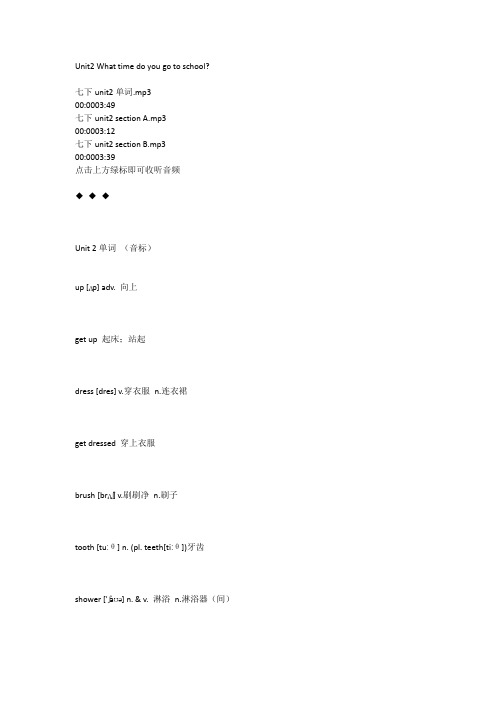
Unit2 What time do you go to school?七下unit2单词.mp300:0003:49七下unit2 section A.mp300:0003:12七下unit2 section B.mp300:0003:39点击上方绿标即可收听音频◆◆◆Unit 2单词(音标)up [ʌp] adv. 向上get up 起床;站起dress [dres] v.穿衣服n.连衣裙get dressed 穿上衣服brush [brʌʃ] v.刷刷净n.刷子tooth [tuːθ] n. (pl. teeth[tiːθ])牙齿shower ['ʃaʊə] n. & v. 淋浴n.淋浴器(间)take a shower 洗淋浴usually ['ju:ʒuəli] adv.通常地;一般地forty ['fɔ:(r)ti] num.四十wow [waʊ] interj.(表示惊奇或敬佩)哇;呀never ['nevə(r)] adv.从不;绝不early ['ɜːlɪ] adv. & adj.早(的)fifty ['fɪftɪ] num.五十job [dʒɒb], [dʒɑːb] n.工作;职业work [wɜːk] v. & n. 工作station ['steɪʃn] n.电(视)台;车站radio station 广播电台o'clock [ə'klɒk], [ə'klɑ:k] adv.(表示整点)……点钟night [naɪt] n. 晚上;夜晚funny ['fʌnɪ] adj.奇怪的;滑稽好笑的exercise ['eksəsaɪz] v. & n. 锻炼;练习on weekends (在)周末best [best] adj.最好的adv.最好地;最group [gruːp] n.组;群half [hɑːf], [hæf] n. & pron. 一半;半数past [pɑːst],[pæst] prep.晚于;过(时间)adj.过去的quarter ['kwɔː(r)tə(r)] n.一刻钟;四分之一homework['həʊmwɜː(r)k] n. 家庭作业do (one’s) homework 做作业run [rʌn] v. 跑;奔clean [kliːn] v.打扫;弄干净adj.干净的walk [wɔːk] n. & v. 行走;步行take a walk 散步;走一走quickly ['kwɪkli] adv. 很快地either ['aɪðə(r)], [ 'iːðə(r) ]adv.或者;也(用在否定词组后)either…or…要么……要么……;或者……或者……lot [lɒt], [lɑ:t] pron.大量;许多lots of 大量;许多sometimes ['sʌmtaɪmz] adv.有时taste [teɪst] v.有……的味道;品尝n.味道;滋味life [laɪf] n.生活;生命Rick [rɪk] 里克(男名)Jim [dʒɪm] 吉姆(男名)Scott [skɒt], [skɑ:t] 斯科特(男名)Tony ['təʊnɪ] 托尼(男名)unit2电子课本Unit2 知识梳理◆短语归纳1. what time 几点2. go to school 去上学3. get up 起床4. take a shower 洗淋浴5. brush teeth 刷牙6. get to 到达7. do homework 做家庭作业8. go to work 去上班9. go home 回家10. eat breakfast 吃早饭11. get dressed 穿上衣服12. get home 到家13. either…or…要么…要么…14. go to bed 上床睡觉15. in the morning/afternoon/evening 在上午/下午/晚上16. take a walk 散步17. lots of=a lot of 许多,大量18. radio station 广播电台19. at night 在晚上20. be late for=arrive late for 迟到◆用法集萃1. at + 具体时间点在几点(几分)2. eat breakfast/lunch/dinner 吃早饭/午饭/晚饭3. thirty/half past +基数词…点半4. fifteen/a quarter to +基数词差一刻到…点5. take a/an+名词从事…活动6. from…to…从…到…7. need to do sth 需要做某事◆典句必背1. —What time do you usually get up? 你通常几点钟起床?—I usually get up at six thirty. 我通常6:30起床。
人教新目标七年级英语下册第二单元大归纳
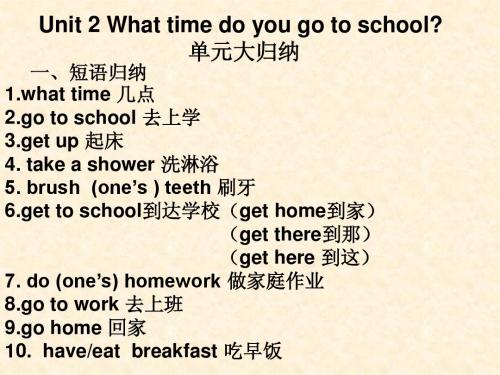
二、用法集萃 1.at + 具体时间点 在几点(几分) 2. have/eat breakfast/ lunch/dinner 吃早饭/午饭/晚饭 3. take a(n) +名词 从事(……)活动 4. half past +基数词 ……点半 5. a quarter to +基数词 差一刻到……点 6. from …to … 从……到…… 7. need to do sth. 需要做某事
一、短语归纳 1.what time 几点 2.go to school 去上学 3.get up 起床 4. take a shower 洗淋浴 5. brush (one’s ) teeth 刷牙 6.get to school到达学校(get home到家) (get there到那) (get here 到这) 7. do (one’s) homework 做家庭作业 8.go to work 去上班 9.go home 回家 10. have/eat breakfast 吃早饭
时间前通常用at. 表示在几点钟 at 5 o’clock at 7:30 p.m.
Unit 2 What time do you go to school? 单元大归纳
11. get dressed 穿上衣服 12. either…or… 要么…要么… 13. go to bed 上床睡觉 14. in the morning/ afternoon/ evening 在上午/下午/晚上 15. take a walk 散步 16. lots of =a lot of 许多,大量 17. radio station 广播电台 18. at night 在晚上 19. be late for 迟到
- 1、下载文档前请自行甄别文档内容的完整性,平台不提供额外的编辑、内容补充、找答案等附加服务。
- 2、"仅部分预览"的文档,不可在线预览部分如存在完整性等问题,可反馈申请退款(可完整预览的文档不适用该条件!)。
- 3、如文档侵犯您的权益,请联系客服反馈,我们会尽快为您处理(人工客服工作时间:9:00-18:30)。
新课标七年级总复习资料Unit 1 Where’s your pen pal from?一、词组be from= come form 来自...pen pal=pen friend 笔友like and dislike 好恶;爱憎live in….在...居住speak English 讲英语play sports 做体育运动a little French 一些法语go to the movies 去看电影an action movie 一部动作片on weekends 在周末Excuse me 对不起,打扰get to 到达、抵达beginning of 在...开始的时候at the end of 在...结束的时候arrive at /二、句型(1)、Where主+be+主语+from?主语+be+from+地点.(2)、Where do/does+主语+live?主语+live/lives in…(3)、What language do/does +主语+speak?主语+speak/speaks….(4)、主语+like/likes+doing…三、日常交际用语1-Where is your pen pal from?-He’s from China.2-Where does she live?--She lives in Tokyo.3-Does she speak English?-Yes,she does/No,she dosen’t.4-Is that your new pen pal?-Yes,he is /No,he isn’t.5-What language does she speak?-She speaks English.Unit 2 Where’s the post office一、词组post office 邮局pay phone 投币式公用电话next to 在...隔壁across from 在...对面in front of 在...前面between…and…在...和...之间on a street 在街上in the neighborhood 在附近on the right/left 在右边/在左边on one’s rig ht/left在某人的右边/左边turn right/left 向右/左转take a walk 散步have fun 玩得开心the way to …去...的路take a taxi 打的/乘出租车go down(along)…沿着...走go through...穿过..have a good trip 旅途愉快二、句型(1)、Is there a bank near here?Yes,there is .It’s on Centre Street.No,there isn’t.(2)、Where’s the sumpermarket?It’s next to the library.(3)、Bridge Street is a good place to have fun.(4)、I hope you have a good trip.(5)、If you are hungry,you can buy food in the restaurant.(6)、Talk a walk though the park..(7)、enjoy后接名词或动词-ing形式.Do you enoy(=like) your work?Do you enjoy(=like) living in the city?三、日常交际用语(1)、Is there a ….?句型Eg:-Excuse me.Is there a hotel in the neighborhood.-Yes, there is. No.there isn’t(2)、Where is …?句型Eg:-Where is the park,please?-It’s behind the bank.(肯定回答)-I’m sorry I don’t know. (否定回答)(3)、Which is the way to +地点? 句型.例如:- Which is the way to the library.(4)、How can I get to +地点?句型.例如:-How can I get to the restaurant?(5)、Can you tell me the way to +地点?句型.例- Can you tell me the way to the post office?(6)、Let me tell you the way to my house.(7)、Just go straight and turn left.Unit 3 Why do you like koalas?一、词组want to do sth .想要做某事want sb to do sth 想要某做某事want sth 想要某物Let sb do sth 让某人做某事kind of 有几分\种类a kind of 一种……years old …年龄如:ten years old 十岁like to do sth 喜欢做某事like doing sthplay with …与...一起玩be quiet 安静during the day 在白天at night 在夜间have a look at.. 看...one…the other 一个...另一个...二、句型(1)、-why do you like pandas?-Because they’re very cure.(2)、-Why dose he like koalas?-Because they are kind of interesting. (3)、-Where are lions from?-Lions are from South Africa.(4)、-What animals do you like?-I like elephants.三、日常交际用语(1)、-Let’s see the lions.(2)-Why do you want to see the lions?-Becase they are very cute.(3)-Do you like giraffes?Yes,I do./ No,I don’t(4)-What other animal do you like?_I like dogs.tooother+ 名词的复数.表示没有特定的数量范围the other+名词的复数表示有特定的数量范围.(5)-Why are you looking at me?-Because you are very cute.(6)-Let us play games. –Great!Let me see.Unit 4 I want to be an actor.一、词组want to be+职业想要成为。
shop assistant店员bank clerk 银行职员work with 与。
一起工作work hard 努力工作work for 为。
而工作work as 作为。
而工作get.. from…从。
获得。
give sth.to.sb /give.sb.sth 把某物给某人正确的表示:give it/them to sb.错误的表示:give sb.it/themin the day 在白天at night 在夜间talk to /with 与…讲话go out to dinners 外出吃饭in a hospital 在医院newspaper reporter报社记者movie actor 电影演员二、句型(1)-What do/does+某人+do?例:-What do you do?-I’m a student.-What dose he do? He’s a teacher.(2)-What do/does+某人+want to be?例:What do you want to be?-I want to be a teacher. -What does she want to be ?She want to be a nuser.(3)-Where does your sister work?-She works in a hospital.(4)-Does he work in the hospiatYes.he doe s/No,he doesn’t(5)-Does she work late?-Yes,she does/No.she doesn’t(6)-英语中询问职业的几种表达方式:What do/does …do?What is…? What is your father?What’s one’s job?例:What’s your father’s job?Unit 5 I’m watching TV.一、词组do homework 做家庭作业watch TV 看电视eat dinner 吃饭;就餐clean the room 打扫房间read newspaper/a book 看报纸/看书go to the movies 看电影write a letter 写信wait for 等待;等候talk about 谈论。
play basketball/soccer/ 打篮球/踢足球take photos 拍照TV show 电视节目Some of。
中的一些a photo of my family 我的家庭照at school 在学校be with 和。
一起in the tree 在树上二、句型(1)-What+be+主语+doing? ….正在做什么?-主语+be+doing。
…正在做某事。
例:-what are you doing?-I’m doing my homework.(2)-Thanks for … 为。
而感谢例:Thanks for your letter.(3)-Here are/is…例:Here are some of my photos.Here is a photo of my family.(4)-That sounds good.(5)-This TV show is boring.三、日常交际用语(1)-Do you want to go to the movices? –Sure.(2)-When do you want to go? –Let’s go at seven.(3)-Where do people play basketball? –At school.(4)-What’s he waiting for?-He’s waiti ng for a bus.(5)-What’s he reading? He’s reading a newspaper.1)现在在进行时的形式是:助动词be(am,is,are)+动词-ing形式(也叫现在分词),表示现在(说话的瞬间)正在进行或发生的动作。
